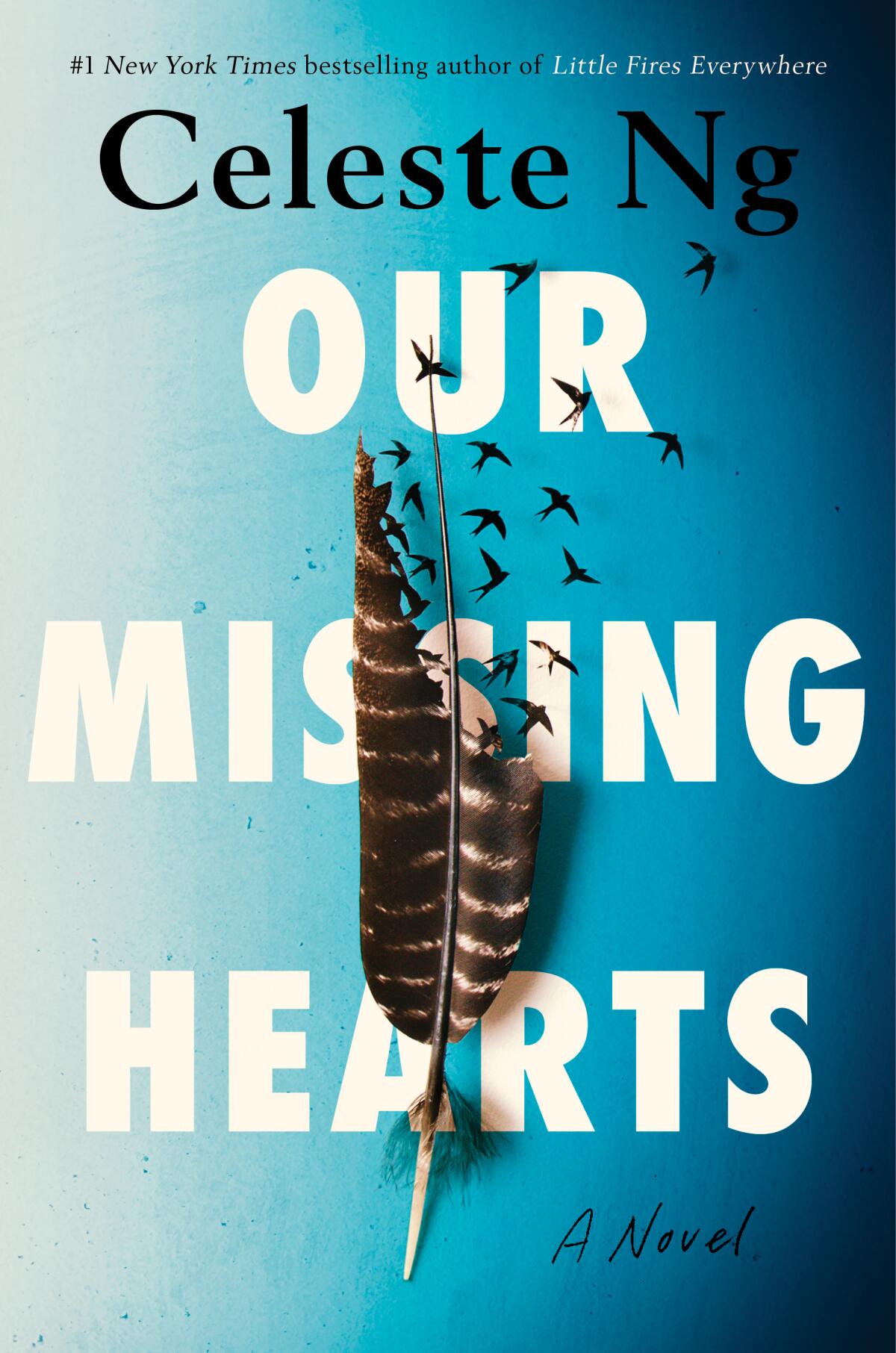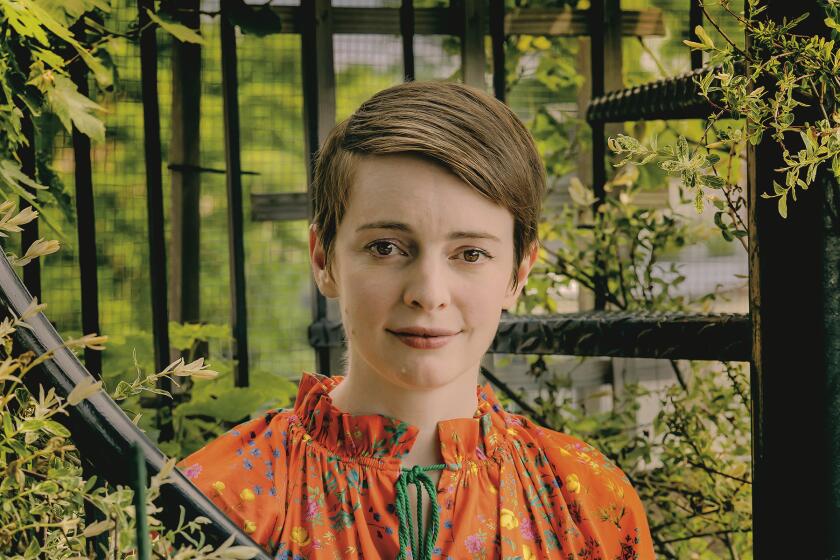Review: ‘Little Fires Everywhere’ author Celeste Ng ventures boldly into the dark future

- Share via
On the Shelf
'Our Missing Hearts'
By Celeste Ng
Penguin Press: 352 pages, $29
If you buy books linked on our site, The Times may earn a commission from Bookshop.org, whose fees support independent bookstores.
At the entrance to the Planet Word museum in Washington, D.C., stands a remarkable sculpture designed to resemble a weeping willow. However, instead of leaves, Rafael Lozano-Hemmer’s tree has tiny speakers drooping from each branch that play 360 different spoken languages, creating a deliberate Tower of Babel, a cacophony of voices that immerses visitors in our shared human need for expression.
When you finish Celeste Ng’s stunning new dystopian novel, “Our Missing Hearts,” you’ll understand why this sculpture comes to mind. The simplest way to put it without spoiling anything is to say that at the core of Ng’s narrative — a 12-year-old boy’s epic quest to find his missing mother — is the all-important question of how we communicate.
Yes, Noah Gardner, whose mother called him Bird, will leave home, endure trials and perform feats, just like any classical hero. But Ng — whose spectacular 2014 debut, “Everything I Never Told You,” was followed by 2017’s equally trenchant “Little Fires Everywhere” — roots her hero’s journey in books and libraries.
Bird’s mother, Margaret Miu, a daughter of Chinese immigrants, is a poet of some stature whose career ended when the United States took a turn into hard xenophobia and passed PACT. The Preserving of American Cultures and Traditions Act encourages bigotry against many groups, particularly Asian Americans, partly in response to China’s increasingly powerful role in the global economy after “The Crisis.”
After Margaret’s disappearance, Bird’s father loses his prestigious position as a linguistics professor. Given a low-level archives job, he must move with his son to a tiny apartment where they face each day with grim resignation. Bird’s main consolation is a friend named Sadie, whose memories of her storytelling parents fill Bird with longing. He remembers his own mother’s stories, and, after receiving a strange missive from her — a page covered with drawings of cats — he also recalls a book she once read to him. The clues begin to constitute a treasure map, leading to the local library he’s been discouraged from visiting.
The latest from Ling Ma, Yiyun Li, Russell Banks and Namwali Serpell as well as exciting newcomers round out our critics’ most anticipated fall books.
There, a librarian accidentally reveals that her collection is also a way of transmitting messages to underground fighters. Many members of the resistance use bright red hearts in their campaigns (such as a truck filled with heart-marked pingpong balls dumped in a river) in a nod to Margaret’s best-known poetry collection, “All Our Missing Hearts.”
In essence, his mother’s poetry becomes a weapon, a tool of resistance — and also a way back to her. Naturally, an epic hero needs a deputy; Bird’s first act is to find Sadie, who has been taken from her home — her Black mother was automatically suspect — and sent to live with a set of bland, compliant foster parents.
One of Ng’s most poignant tricks in this novel is to bury its central tragedy — the forcible separation of children from their parents — in the middle of the action. This raises the narrative from the specific story of a confused boy and his defeated father to a reflection on the universal bond between parents and children, a core value sacrificed on the pyre of Ng’s populist authoritarianism.

Sadie is more than an archetypal sidekick; she is a prod to action. Juggled between foster parents, the rebellious young woman has always found ways to stay true to her upbringing. Early on, she cut her own mass of curly hair with kitchen shears rather than endure a caretaker’s comb. Even in early adolescence, Sadie believes in resistance, and she believes her parents (and Bird’s) belong to it. “She’s one of them,” Sadie insists to Bird. “She’s out there somewhere … Just like my parents.”
As Bird ventures into danger, we begin to understand his father’s extreme caution and fear differently; he seems less a man shut down by adversity and more a valiant protector of his son. We also understand what often grounds true rebellion: Sadie, like Bird, has known parental love, the kind that allows people to stop fearing “What if?” and start insisting “Even if ... “
Things get much busier in the second half of “Our Missing Hearts.” Bird and Sadie wind up in a Manhattan as chaotic as ever, though even scarier, sheltered by a rich eccentric from Margaret’s past (essentially the deus ex machina here). Coming together, even in small communities, makes a difference during dark times. We all understand that now, having hunkered down with pandemic pods of our own. Comrades inspire bravery in big and little ways.
‘Sea of Tranquility,’ Emily St. John Mandel’s new novel, is as ambitious as ‘Station Eleven,’ again using sci-fi tropes to ask deeply human questions.
This is where Margaret departs from her own group. Yes, she’s still alive, and yes, she’s been on the run; neither of those facts spoils the book’s denouement. Margaret reminds us of true moral courage, plotting a nonviolent but highly effective scheme to disrupt the PACT regime. As Ng tells us at the end of an Author’s Note, “Václav Havel’s classic 1978 essay ‘The Power of the Powerless’ changed my thinking about the impact a single individual could have in dismantling a long-established system. I hope he’s right.”
Like many of her fellow writers of dystopian fiction, including Margaret Atwood, P.D. James, Philip K. Dick and Hillary Jordan, Ng harnesses the power of the David-and-Goliath story — a prototypical quest story that has the benefit of maybe being real. Or if it isn’t, it accords with history. The asymmetrical power of a smaller group pitted against a large, corrupt state is more than just a great storytelling trope. It has happened many times in recorded history. It is happening today, for instance in Ukraine.
While briefly reunited with his mother — this book is also a parent-child love story — Bird believes Margaret when she says she will return to him after she’s accomplished her mission. But we already understand that the government will find her. We also know that, while she acted alone, she isn’t the lone resister. Others exist; others will rise up.
The author concludes with the same controlled tone that opened the novel, showing us a new generation of resisters, including Bird and Sadie and their confreres, who start to think about what comes next for them as friends and human beings. “Our Missing Hearts” will land differently for individual readers. One element we shouldn’t miss is Ng’s bold reversal of the biblical story of the Tower of Babel. It is the drive for conformity, the suppression of our glorious cacophony, that will doom us. And it is the expression of individual souls that will save us.
The nation fell fast and right under everyone’s noses.
Patrick is a freelance critic who tweets @TheBookMaven.
Book Club: If You Go
What: Novelist Celeste Ng joins the L.A. Times Book Club to discuss “Our Broken Hearts” with columnist Patt Morrison.
When: Dec. 8 at 6 p.m. Pacific.
Where: Live streaming online. Sign up on Eventbrite for tickets and autographed books.
Join us: Sign up for the book club newsletter for latest news and events.
More to Read
Sign up for our Book Club newsletter
Get the latest news, events and more from the Los Angeles Times Book Club, and help us get L.A. reading and talking.
You may occasionally receive promotional content from the Los Angeles Times.











